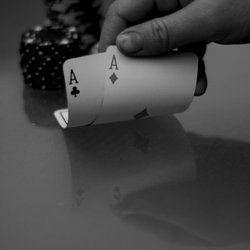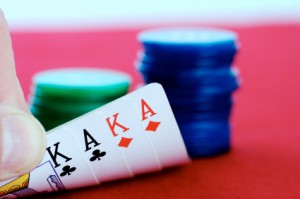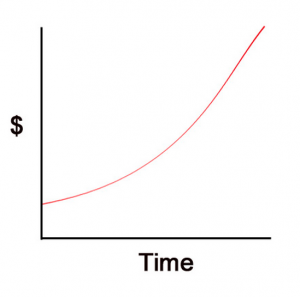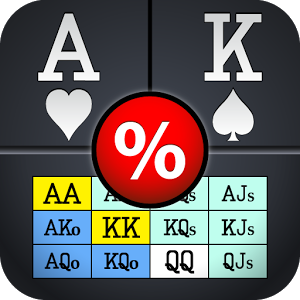Some of the most important decisions you will make during a session are made at the outset, before a single card is dealt to you. In this month’s article I am going to look at those decisions and the thought processes you should go through when making them.
Before looking at them in detail, I should point out that most of the decisions listed below cannot be made in isolation. Depending on your poker knowledge and the state of your bankroll, you may give additional weight to some decisions over others. In some situations, the answer to one of the questions may be so important that it will override all of the other decisions.
1. Which site should I log in at?
The bigger the site, the more likely you will be to find the type of game and limit you want to play. Furthermore, the greater the potential number of opponents, the bigger the advantage for someone who is willing to scout around to ensure he plays with opponents who make plenty of mistakes.
Small sites will allow you to build up information on a fixed number of opponents, but in my opinion this only compensates for a wider choice of tables if the general standard of play is poor.
Other factors you will take into account when deciding upon which site to play at will be speed of cash outs, customer service, software playability and bonus schemes.
2. What game should I play?
Hold’em is the most commonly played game but that does not necessarily mean it is the game you should play. In the last 12 months, most of my profit has been derived from Omaha hi/lo (O8B) even though most of my hours logged have been at hold’em. The advantage of hold’em is the sheer weight of literature you can draw upon to improve your game. Of course, that literature is available to your opponents too!
With games other than Hold’em you will often find players making more mistakes due to lack of education. With certain games, the mistakes that they make will provide you with a greater edge than Hold’em could offer. For example, I would rather have a player call my EP raise with QQQ7 in O8B than I would have a player call my raise with Q7s in Hold’em.
3. What format should I play?
The choice is between tournament and ring games. The tournament structure will range from a single table Sit and Go (SnG) to huge multitable tournaments.
Ring games allow you to choose a profitable table and take advantage of seat selection. Even if you have not played with the opponents at your table before, the advantage of ring games is that you can usually make general assumptions based on stack size. Of course, if after a couple of circuits you realise that the table you are at is not profitable (or no longer profitable) you are free to change tables.
With tournaments you have no information on any of your opponents (unless you have played with some of your opponents before) and you are unable to make any assumptions until the cards are dealt. However, with large fields you have the potential for a great return on your initial buy in.
4. How many opponents should I play against?
For beginners, I strongly advise sticking to full tables while you pick up the basics. Once you have a greater feel for the game and more experience in adapting to your opponents’ playing styles, then it may be the time to move to the shorthanded tables. Sometimes, even if you have a sufficient feel for the game to succeed in the long run, the short term fluctuations inherent in shorthanded play can be a deterrent for the risk averse.
Shorthanded play requires more decisions and therefore someone will benefit from the additional mistakes being made. The key is not to be the person making them!
With fewer players at the table, playing your opponents (rather than playing mainly your cards) becomes more and more important. At its most extreme, if you decide to try heads up play your optimal strategy will depend almost entirely on the playing characteristics of your opponent.
5. What betting structure should I play?
The three main choices are Limit, Pot Limit (PL) or No Limit (NL).
Most beginners start out after watching poker on TV and mistakenly believe that NL is the way to go. However, I would advise anyone taking up the game to start with limit. By starting with limit you can get a feel for pot odds and starting hand requirements, essential skills for any format of the game.
Once you have progressed as a player, you can then decide to make the switch to PL and NL. If you do decide to play NL, I can tell you from experience that as you progress towards the higher limits the standard of play is extremely tough (especially in larger buy in SnGs). Fortunately, there never seems to be an end to the poor players willing to take a shot in limit ring games and that is why most players who play online for a living derive their income from limit ring games.
6. What limit should I play?
This decision is a function of the size of your bankroll, your ability and the profitability of the tables on offer.
Many people forget about table profitability and will not even think about playing a table at a limit below their usual limit. For example, even if your have the bankroll to play 5/10 it would be foolish to play the table with the 22% see flop percentage and 48$ average pot when there is a free seat at a 3/6 table with an average pot of 50$.
7. How many tables should I play?
Just like I advise beginners to play full limit ring games, I also advise them just to play just one table whilst they are picking up the basics.
The truth is that you “should” achieve your highest big bet per 100 hands figure (bb/100) playing a single table. However, you will be limited by the number of hands you can play if you only play one table.
In my opinion, many players underestimate the hit their bb/100 takes when they add additional tables. This is particularly true when the standard of the opponents’ play is reasonable or better.
At high limits I would never play more than 2 tables of hold’em. However, I am quite prepared to have four or more full O8B tables open because the game is more mathematical and to a certain degree (at full tables), less opponent dependent.
To conclude, it would seem logical to make the decisions which will provide you with the most profit. That is not to say that profit should be your only consideration. Your decisions will be influenced by other factors such as the amount of time you have to play and the need to gain experience so as to improve certain aspects of your game.
One factor which influences many players’ decisions is a need for “action”. In a lot of cases, this need for action can distort the decision making process so much that it becomes the most important factor. I know many players who log on, go to the x$/y$ section and sit down at the first 4 x$/y$ 6 max tables they can find with available seats. If you are one of those players, you should really ask yourself whether you are taking every step to maximise your profit.
8. Which table(s) should I choose?
Obviously, this is only a consideration in regard to ring games because under a tournament structure you have your table randomly allocated. However, if you are going to play a ring game then table selection can have a major impact on your expectation.
Let’s imagine that after asking the above questions (1-7) you are going to play 2 full (10 player) 3/6$ Hold’em tables. However, there are 30 tables available at the site you are logged in at. Which tables should you choose?
Most beginners make the mistake of ticking the “first available” table box as they desire to start playing as quickly as possible. This is clearly a mistake as the aim is to try and find a table where your opponents are making as many mistakes as possible.
A high average pot is a good indicator of this but you should be aware that when there is a high average pot there will often be one player getting the table worked up because he is playing every hand aggressively. Two things often happen:
1) the queue is so long for the table that by the time you join the table the maniac has bust out and you are left at a table of people who practice what they think is “game selection” (so normally above average players)
2) even if the maniac is still there you have one seat you can take and it is pot luck whether it gives you good position over him so that you can play the hands you would like to play (see decision 9 for more discussion on this).
Other good indicators of a profitable table are if you see a player who is on your buddy list (i.e. you have played with him before and have noted he is a poor player) or if a number of players are extremely short stacked.
Ideally, once you have found a good table you would like to observe for a circuit or two but realistically, given the amount of time it can take for a good table to break up (especially if there are one or two extremely short stacked), you should probably start as soon as it is your turn to post the big blind.
9. Where should I sit?
When it comes to seat selection, the ideal situation is to have loose players acting before you and tight players acting after you. In this scenario, you will know when you have the opportunity to play the more speculative hands because you will often have many limpers before it is your turn to act. Furthermore, with tight players behind you, on the odd occasion it is folded to you the opportunity is there to raise and steal the blinds.
Even if I intend to play at a full table I will always try and pick a table which only has 6 or 7 players currently seated so that I have a wider choice of seat selection (and most of the time the table will fill up around me). Once at the table, assuming I know none of my opponents; I will sit to the left of as many of the weaker looking players (short stacks) as possible. If it becomes clear that there is a more profitable seat at the table I will think nothing of leaving the table and rejoining in the more profitable seat.
10. What day / time of day should I play?
Unfortunately, this is a decision which for most is outside of their control because of other factors (jobs, family, sleep and so on) but if you had total freedom to play whenever you wanted, when would be the most profitable time to play?
From experience, I would say that the play is weaker at weekends than during the week. This is because you get more recreational players who can only play at the weekend.
In regard to the time you should be playing, it is clear that most sites are busiest during U.S evening time. This gives you a wider selection of players to play against and more opportunity to practice game selection.
11. How much should I buy in for?
In NL (no limit), assuming you are a winning player, you will always want at least the maximum buy-in in front of you. When I am playing NL, I always rebuy back to the full buy in as soon as I dip under this amount .
In limit, of course, how much you can win is not dictated by your stack but instead, by the betting limit. Most players will automatically click the standard buy-in (usually about 25 big bets). The key is to make sure you always have enough to cover a potential cap on each street because you never know if the next hand is going to be the one where you are going to hit a huge hand.
12. What name should I choose?
Is this an important decision? Apart from looking back on your name in three years time and wishing you had chosen something more glamorous, could it possibly have an influence (no matter how small) on your winnings?
It would be hard to prove one way or the other, although it is fair to say that you can usually get some kind of feel about the personality of an opponent by the name he has chosen.
13. Should I participate in any chat?
Observing the chat box is a really good way of getting a handle on how your opponents think (or are thinking at that moment). That is why I would never complain about profanities or turn off someone’s chat. Comments like “I can’t believe you raised with nothing” or “2 outer again” when in the first instance you had a huge draw against a big field and in the second you actually had 11 outs, gives you information which may be useful in future hands.
I hope this article has provided you with some interesting thoughts on the decisions you should be making before you play a hand. Remember though, this game is not static and that throughout your session you should be re-evaluating the decisions constantly to ensure that you are always playing under the most profitable conditions.
Next month, I am going to look at the 5 hands that helped form me as a player. Until then, keep focusing on your decisions to ensure you stay one step ahead of your opponents.
Submit your review | |









